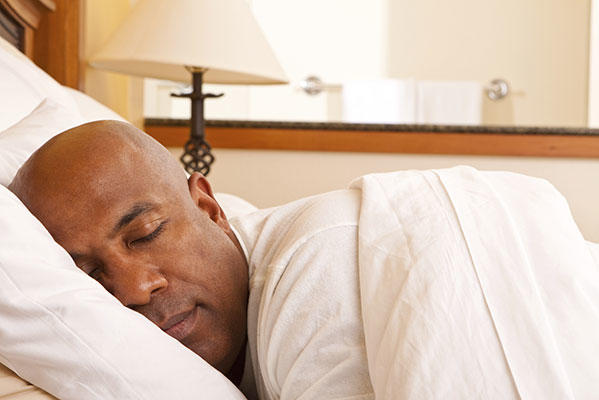What sleep problems are common in people being treated for cancer?
Sleep problems such as being unable to fall asleep and/or stay asleep, also called insomnia, are common among people being treated for cancer.
What causes sleep problems?
Sleep problems may be caused by the side effects of treatment, medicines you are taking, long hospital stays, stress, and other factors. Studies show that as many as half of all people have sleep-related problems during treatment for cancer.
How are sleep problems assessed?
Your doctor, or a sleep specialist, can do an assessment, which may include a polysomnogram (recordings taken during sleep that show brain waves, breathing rate, and other activities such as heart rate) to correctly diagnose and treat sleep problems. Assessments may be repeated from time to time, since sleeping problems may change over time. Learn more about when a sleep study may be useful, what to expect, and what your doctor may recommend after a sleep study.
Why is a good night's sleep important?
Sleeping well is important for your physical and mental health. A good night’s sleep may help you to think more clearly, lower your blood pressure, help your appetite, and strengthen your immune system. Sleep problems that go on for a long time may increase the risk of anxiety or depression.
Ways to manage sleep problems
Talk with your health care team if you have difficulty sleeping, so you can get the help you need. There are steps that you and your health care team can take to help you sleep well again.
- Tell your doctor about problems that interfere with sleep. Getting treatment to lower problems such as pain or other side effects such as urinary and bladder problems, or diarrhea, may help you sleep better.
- Cognitive behavioral therapy (CBT) and relaxation therapy may help. Practicing these therapies can help you to relax. For example, a CBT therapist can help you learn to change negative thoughts and beliefs about sleep into positive ones. Strategies such as muscle relaxation, guided imagery, and self-hypnosis may also help you.
- Set good bedtime habits. Go to bed only when sleepy, in a quiet and dark room, and in a comfortable bed. If you do not fall asleep, get out of bed and return to bed when you are sleepy. Stop watching television or using other electrical devices a couple of hours before going to bed. Don’t drink or eat a lot before bedtime. While it’s important to keep active during the day with regular exercise, exercising a few hours before bedtime may make sleep more difficult.
- Sleep medicine may be prescribed. Your doctor may prescribe sleep medicine, for a short period if other strategies don’t work. The sleep medicine prescribed will depend on your specific problem (such as trouble falling asleep or trouble staying asleep) as well as other medicines you are taking.
Talking with your health care team about sleep problems
Prepare for your visit by making a list of questions to ask. Consider adding these questions to your list:
- Why am I having trouble sleeping?
- What problems should I call you about?
- What steps can I take to sleep better?
- Would you recommend a sleep therapist who could help with the problems I am having?
- Would sleep medicine be advised for me?
